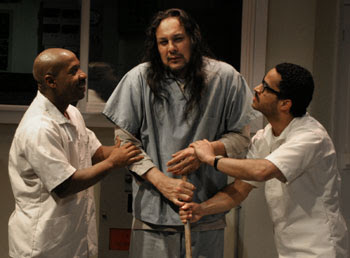
Thursday and Friday's notes:
The novel The Great Gatsby by F. Scott Fitzgerald
characters: Nick Carraway (third person limited narrator), Jay Gatsby (working class guy, who while stationed in Louisville, Ky before shipping out to Europe to fight, meets and falls in love with weathy, flighty Daisy Buchanan. She becomes his reason d'etre and he devotes his life to creating the life to which she is accostomed, so that she will leave her husband Tom and be with Gatsby. Unfortunately, this is the 1920's and his easiest option is bootlegging. He owns a chain of drug stores. He represents the nouveau riche, new money, while Tom and Daisy are the established monied, having attended the right schools and a place in the social register.
Daisy Buchanan - Gatsby's love interest; however, when push comes to shove, as in her having killed Myrtle and Gatsby takes the blame, she takes off with her husband Tom.
Tom Buchanan- educated at Yale, privledged, arrogant, racist, anti-semitic, philanderer (having an affair with Myrtle- one of many)
Nick Carraway- Daisy's cousin; in New York and living in West Egg Long Island for the summer, where he meets his neighbor Gatsby.
themes of disloyalty, the quest for the Ameican Dream, how love drives life, how love deludes
novel Black Boy by Richard Wright
this is a fictionalized version of his life
setting: 1920's / 1930's: rural Mississippi, Memphis and Chicago--time of the Jim Crow Laws
grows up in poverty; father deserts family, very conservative religious atmosphere
plot notes: burning down the house, regualar beatings, derided for his interest in literature
theme of hunger, both literal and metaphorical. Literature is his salvation. Man gives him library card; teacher shares fictional stories
poem Thanatopsis by William Cullen Bryant
Romanticism / transcendentalism- mid 19th century
a meditation on death
Life is cyclical; the soul is ever present in Nature, which is viewed as a manifestation of God. Death is not to be feared, for it's a continuation, a dream
the tone is pensive and optimistic, for there is constant renewal
Themes of individualism, renewal of of life, and the interconnectedness of all things.
play The Crucible by Arthur Miller
setting 1690 in Salem, Massachusetts; this conservative religious settlement north of Boston is bounded by the wilderness to the west where the native peoples live and the ocean that separates them from their English home by three thousand miles.
Remember that the play was written as a parallel to the actions of the House of Unamerican Activities in the 1950's. In Salem, a group of girls accused villagers of witchcraft in order to protect themselves from being punished for having danced and conjured up spirits in the forest.
Themes: hysteria in contrast to logic and reason
importance of one's name
value of personal integrity
Abigail Williams and John Proctor are the central characters. Having "bedded her like a stallion" while she was working in his home, they were caught and Protor's wife Elizabeth threw her out. Abigail is angry, but still wants John, so she accuses his wife.
play Hamlet by William Shakespeare written about 1600; setting is 13th century Denmark
plot essentials: Hamlet's father returns as a ghost and informs his son that he has been poisoned by his brother Claudius, who is, incidently, now king and married to his wife Gertrude. Now Hamlet didn't like the situation before, for a month between funeral and remarriage is abrupt, that the relationship between the queen and her new husband is incestuous and the new king doesn't hold a candle to his wonderful dad-also there's a bit of Oedipal stuff with his mum.
So Hamlet arranges to insert some extra lines into a performance of The Marriage of Gonzago, so that he "can catch the king"- and he does. Now the rest of the play is his actually moving forward and revenging his father's death. Slow going......
He feigns madness; dumps Polonius' daughter Ophelia, who takes it very hard (she has a breakdown and drowns- sucide? no, as the water did the drowning. The play is a tragedy, which means that this catastophe is inevitable. Lots of folks die: poor Polonius (there is an allusion to him in Prufrock; Gertrude is accidentally poisoned when she drinks the wine meant for Hamlet; Claudius is forced to drink the dregs, so he's gone; Laertes in revenging his sister Ophelia's death is stabbled with the poisoned-tipped rapier and of course, good ole Hamlet has been also stabbed.
Please note the connections with J. Alfred Prufrock.
tone: haunting, suspenseful
themes: revenge, impossibility of certainty, what happens when politicians (kings) are corrupt
and of course, note Hamlet's anxiety / his angst- his inablitly "to take arms against a sea of troubles and by opposing end them." Again think of Prufrock.
Poem The Love Song of J. Alfred Prufrock by T. S. Eliot
written 1916
The poem is reflects the disillusionment and despair that comes out of the Great War. The Western value system has collapsed and life is deemed directionless and pointless. The operative word is nihilims: nothing. Our character, the eponymous Prufrock, stands before a mirror contemplating a marriage proposal; he never leaves this spot, nor do learn the woman's name. He is a vain, solipsistic, insecure man, who is incapable of action. He rehearses the proposal in "the room where women come and go / talking of Michelangelo"; yet he anticipates a rejection, so never asks for her hand.
Eliot uses figurative language devices to create the despair, anxiety and overall inability for Prufock and the society, to take action, to choose a new direction. (think Hamlet here) This is accomplished through personifying the fog to a cat, the imagery of the streets with cheap sawdust-floored restaurants and hookers, and numerous allusions, including one specifically to Hamlet..
Hamlet and Purfrock are much in contrast to someone like John Proctor, who refuses to sign his name or even Captain Ahab from the novel Moby Dick by Herman Melville. This sea captain is obsessed with destroying the great white whale that took his leg, even if it meant destroying himself and others.
These are the works you chose to review in class; you may use any others for the ELA as well.





